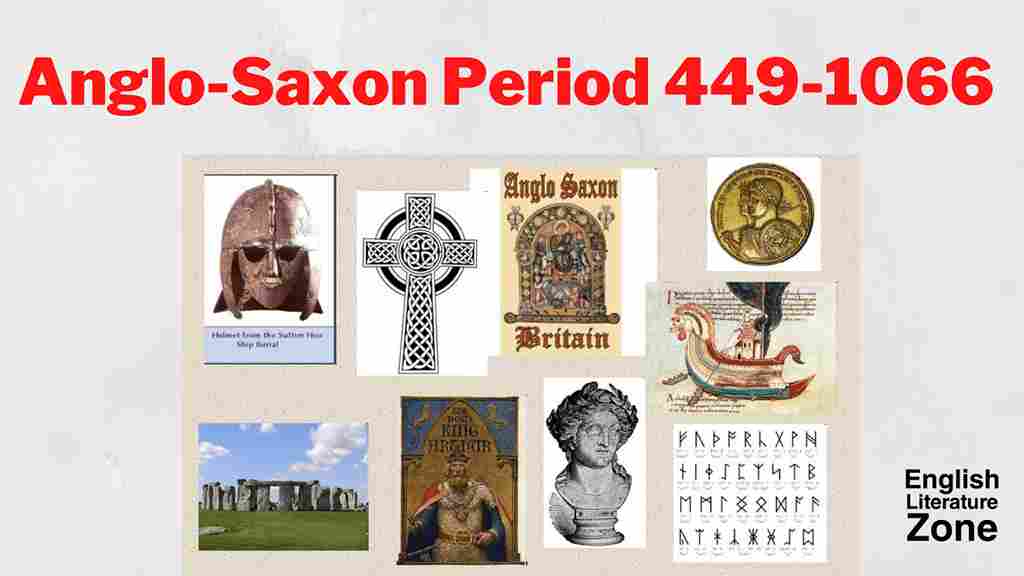The Anglo Saxon Period Literature 449 To 1066 | The old English Period

Introduction
The Old English period is also known as the Anglo Saxon period. The age started in the fifth century when the Jutes, Angles, and Saxons came to England Britain from Germany, defeated the English tribes, and started their reign. The Old English period began around 449 and lasted until 1066. During this period the two tribes – ‘The Angles and Saxons’ contributed a lot to the development of the Anglo-Saxon language and culture. In this period Latin Brooks was translated into Old English and people could read and understand them. The historical events which influenced the literature of this period were –
- Christianity reached England and the Christianization of the pagan English tribes began.
- In the 7th century, monasteries were established where a written began. Earlier to this whatever existed as literature was oral.
- Alfred the Great who reigned over England from 871 to 901 encouraged education and supervised the compilation of the Anglo-Saxon Chronicle.
Old English literature was almost exclusively verse literature in oral form. It could be passed down by word of mouth from generation to generation. Its creators for the most part were unknown. When we talk about poetry in Old English literature, There were two groups of poetry in the Anglo-Saxon Period. The first group was “Pagan Poetry” represented by ‘Beowulf’, and the second group was religious poetry represented by the works of Caedmon and Cynewulf.
Old English or Anglo-Saxon Poetry
Pagan Poetry
“Beowulf” is the oldest poem in English Literature. It is a perfect example of Pagan Poetry. Here ‘Pegan Poetry’ refers to a heroic poem celebrating the exploits of a great warrior. It reflects the ideals of that state of society, which we call the ‘Heroic Age’. ‘Beowulf’ is the Oldest surviving epic in English literature. It consists of more than 3000 lines, It has been passed from mouth to mouth for hundreds of years before it was written down in the 10th century or at the end of the 9th century. The main stories in the poem are based on the folk legends of the primitive northern tribes.
Religious Poetry
Caedmon is the first known religious poet of England. He is known as the father of English songs. His life story is vividly described in Bede’s Historia Ecclesiastica. Caedmon’s first poem was “The Hymn of Praise”. Later on, encouraged by the success of his first poem, Caedmon composed many other poems by winging biblical material.
Cynewulf and His Poem
Cynewulf lived in the early 9th century. Except for the unknown composer of Beowulf, he is regarded as the greatest Anglo – Saxon poet. On his life story, we know very little. He was probably an ecclesiastical and a scholar. His remains unknown until 1840.
Anglo Saxon Or Old English Prose
In the 8th century Old English prose appeared. The famous prose writers of that period were ‘Venerable Bede’, ‘Alfred the Great’ and ‘Aelfric’.
Venerable Bede
When we speak of the Old English Prose, the first name that comes into our mind is Venerable Bede, who is the first scholar in English literature and has been regarded as the father of English learning. His works, over 40 in number, were written exclusively in Latin. The most important of his works in “The Ecclesiastical History of English Literature”. It is in this book that Bede describes Caedmon’s legendary life story.
Alfred the Great
Alfred the Great King of Wessex Kingdom, is another important figure in the prose writing of the Anglo-Saxon period. During his reign, he tried every means to improve education by founding colleges and importing teachers from Europe. He was a well-known translator. He translated some important Latin works into English, among which, the most important is ‘The Anglo-Saxon Chronicle’. This book records the main happenings of the Anglo-Saxon period.
Aelfric
Aellfric was a clergyman. He wrote a large number of religious works in Greek and Latin. In his works, he introduced lighter, clearer, and more musical prose.
The Anglo-Saxon or Old English period ended in 1066. A. D. when the last king of Saxon Harold was defeated by William the Conqueror of Normandy at the battle of Hosting.
Conclusion
Thus, we can see the German effect in Anglo Saxon Period or Old English Period. Angles, Saxons,s and Jutes immigrated in the 5th and 6th centuries and set up kingdoms. So we can see that there are religious cultural and language exchanges in society. People started to convert to Christianity. Women were significant and they had to obey men. There were wars at that time that affected work. Works were oral and monks produced literary works in order to transmit those next-generation church and religious languages that were Latin.
So we can say that the Old English period or the Anglo-Saxon period contributed a lot to the development of English Literature.
Are you struggling to keep up with your English Literature Coursework? Do you need detailed, customized English Literature Notes to help you better understand the texts you’re studying? “Look no further! Our customized paid notes will help you achieve your study goals quickly.
The Anglo Saxon Period Literature 449 To 1066 | The old English Period Read More »
